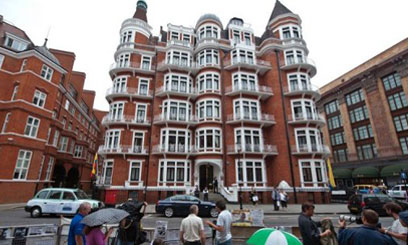After the announcement, British police beefed up their presence outside the embassy, which is next door to the famed Harrods department store, with around 30 officers and nine vans stationed around the building.
Earlier clashes with police which resulted in three arrests failed to spoil the mood of the 50 or so Assange supporters as the news filtered through.
They danced, cheered and chanted “Assange freedom fighter” after a protester announced Ecuador’s decision over a megaphone, while rock music blared from a stereo brought in from the occasion.
“It’s great news, great for freedom of information,” said one protester from the hacking group Anonymous, a 28-year-old man with a Guy Fawkes mask from the film V for Vendetta pushed back over his head.
“This shows that there are still countries out there that support the little guy,” he added.
“Anonymous will carry on fighting for Julian Assange even when he is in Ecuador, for Bradley Manning (the US soldier accused of leaking information to WikiLeaks) and for all the other Julian Assanges out there.
“More and more people will become politically aware because of this and get off their sofas.”
Like the Ecuadoran government, the protesters all criticised Britain’s threat to raid the embassy and arrest Assange so he can be extradited to Sweden to be questioned over allegations of rape and sexual assault.
Ian McDonald, 42, from west London, said he had walked four miles (six kilometres) to the upmarket Knightsbridge area where the embassy is located.
“I came here to see if the British police are going to be forced into escalating this. Arresting the guy is not going to solve anything,” he said.
“I’m very disturbed at what the British government is doing. They are going against international law, against someone who has been granted political asylum. Who the hell do these governments think they are?”
Police in stab-proof vests lined the pavement outside the embassy, which consists of an apartment on one floor of a redbrick block.
On a couple of occasions they pushed back protesters in Anonymous masks who got too close. The activists held signs saying “We are all Julian”.
But for the most part there was a carnival atmosphere with protesters chanting “Hands off Ecuador!” while banners reading “Free Assange” and “Protect whistleblowers” hung from barricades put up by police to contain them.
Bemused local residents and foreign tourists helped swell the crowds.
One protester brought a small dog which yapped at reporters. “His name is Tito. He says he supports Julian Assange’s right to free speech,” the protester said, smiling.
A few activists camped out overnight outside the embassy to show solidarity with Assange, whose website has published hundreds of thousands of secret US government documents.
Liliana Calle, a 24-year-old Ecuadoran living in London, said she supported Assange because she believed in freedom of speech.
“I believe 100 percent the case against him is politically motivated,” she told AFP. “His only sin was to campaign for freedom of speech.”
Assange has been holed up in the embassy since June 19, when he claimed political asylum in a bid to avoid extradition to Sweden.
He believes that if he is sent to Sweden he could eventually be passed to the United States, which has mulled legal action against him for his publication of confidential files on the wars in Iraq and Afghanistan.
Britain has told Ecuador it will press ahead with its moves to extradite Assange despite the Quito government’s decision.
Embassies are considered part of the foreign nation’s territory under international law.
Farhan Rasheed, a historian, said he came to protest at the embassy because he believed any move by Britain to storm the embassy would put British diplomats at risk.
“If we go against other people’s diplomatic immunity, that puts our own diplomats at risk around the world. It would be an own goal,” he said.
“One can’t lecture Iran and other countries about the treatment of our diplomats if we behave in that way.”


































